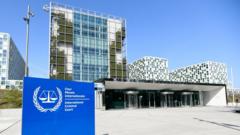Designed to act when national authorities fail to prosecute, the ICC operates based on the Rome Statute, which came into effect on July 1, 2002, and has been ratified by 124 nations, though notable exclusions such as the United States and Israel pose challenges for its authority. Since its inception, the ICC has pursued several landmark cases, notably convicting Thomas Lubanga for war crimes in 2012, but it has faced criticism for its perceived focus on African nations, which it denies.
The court, lacking an independent police force to arrest suspects, depends on national governments' cooperation for enforcement. Cases may arise from UN Security Council referrals or self-referrals from member states, while prosecution approval lies with a panel of judges chosen by the participating states. Highlighting its global relevance, the ICC recently issued a warrant for Russian President Vladimir Putin over accusations related to the ongoing Ukraine conflict.
Despite its mission, the ICC finds itself at a funding disadvantage due to the absence of significant contributors like the US, which abstained from ratifying the treaty out of concerns for politically motivated prosecutions. Other major powers, including China and India, have also opted out. Still, member states endeavor to adapt their domestic laws to align with ICC statutes, contributing to a complex interplay between international and national judicial systems.
In summary, the ICC continues to navigate its role on the world stage amid various political dynamics and legal challenges, emphasizing the global community's commitment to accountability for the gravest crimes.
The court, lacking an independent police force to arrest suspects, depends on national governments' cooperation for enforcement. Cases may arise from UN Security Council referrals or self-referrals from member states, while prosecution approval lies with a panel of judges chosen by the participating states. Highlighting its global relevance, the ICC recently issued a warrant for Russian President Vladimir Putin over accusations related to the ongoing Ukraine conflict.
Despite its mission, the ICC finds itself at a funding disadvantage due to the absence of significant contributors like the US, which abstained from ratifying the treaty out of concerns for politically motivated prosecutions. Other major powers, including China and India, have also opted out. Still, member states endeavor to adapt their domestic laws to align with ICC statutes, contributing to a complex interplay between international and national judicial systems.
In summary, the ICC continues to navigate its role on the world stage amid various political dynamics and legal challenges, emphasizing the global community's commitment to accountability for the gravest crimes.






















